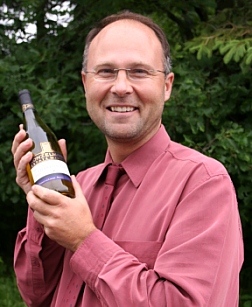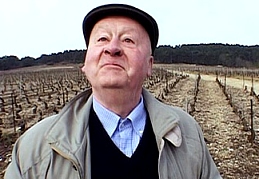|
|
|
Wine at Your Table:
Going Organic |
|
|
|
|
|
Hugh Kruzel |
|
|
|
However, I am now reading the novel "Sideways" by Rex Pickett and finding a deeper sense of appreciation and elitism that both pulls me onwards and pushes me away. The smudged morals of the characters are empty of value, while Xanax seems the only route to some degree of coping. Is author Pickett laughing at us, or with us? Rose coloured glasses are one thing, but should the players be so void of direction that the numbing of too much alcohol be a route to Nirvana? A metaphor for life and marriage, this is one “twisted” text. I set out to write about wines and instead become philosophical.
Contemplating wine is a challenge. Should we look at Pinot Noir? Why not grab hold of another trend – Organics.
Edward Finstein, aka The Wine Doctor, caught my attention with this observation: “ … you don’t have to be a hippy to want to drink organic wines.” There are no international standards, but by definition organic producers follow the no pesticide/no herbicide rule. Many of the quality producers have already been doing this, or historically have never applied chemicals because of tradition. Some have chosen to cut costs, while others have looked at the premium that can be squeezed from this designation. Improving quality is the name of the game for most. They want better fruit that is cool, hand-harvested, at peak. They are ahead of mechanically cleared bunches of grapes. Without a doubt, hand-selecting the best fruit is a superior method to selecting for minimum/maximum tolerances suggested by models, spreadsheets, accountants and chemists. Hand-harvesting with a winemaker in the fields (tasting and evaluating sometimes 4 or 5 times per day as the pick approaches) is much better than having a number cruncher do it just because it fits into the calendar. It is about the art not the science.
Naturally, using the wild yeasts already on the grapes creates a sense of locale too. Because they have not been killed off by pesticides, these yeasts connect the wine to the geography and geology of place. Authentic taste is about the stamp of “here and now” and is something that bio-dynamic growers foster. Why must we ape the policies of others when they are unsuited for originality of place and time? For those amongst us who find sulfur/sulfites cause health issues, these wines are a godsend. Because the levels of sulfites or even the blend of grapes change harvest-by-harvest, visit the websites for each winery. Check LCBO for availability and prices.
There is rarely one shelf or section for organic wines, however, active marketing is occurring and displays the emerging mainstream nature of these products. The LCBO’s "Vintages" catalogue now frequently has 10 to 12 new organic choices being offered each month. Because demand is increasing, you need to order these bi-monthly releases early. It is encouraging to see more availability and greater diversity of wines. Here are five choices readily accessible in Ontario. White: Nativa Carmen 2004, Chardonnay, Valle del Maipo, Chile, Certified Tasting Notes: Full of ripe melon and pineapple, the bottle prominently states, “Organically grown grapes,” while the back label talks of harmony with the environment, respect, and sustainability. Red: Nativa Carmen 2002, Cabernet Sauvignon, Valle del Maipo, Chile, Certified Tasting Notes: Big Berry with mint and lots of smoke. Very drinkable now, though the 10 months in Oak suggests it can be saved for another year or two. Red: Chateau Saint Germain 2002, Syrah/Granache, Languedoc, France, Certified Tasting Notes: This unfiltered wine is rich with deep purples, ripe citrus rind, and spices. Herbs like rosemary wait in the background. There is more text on this bottle than any other French wine on the market. It talks of the soil and the winemaker, while providing a lesson in Roman history. The extremely low yields and cool evening breezes pack a real flavour punch. I am reminded of Peter Mayle’s "A Year in Provence," while the back label goes on about the “… chatter of cigales (crickets of southern Provence - aka cicadas or locusts) on a warm summer day.” Closer to Home: These last two Frogpond wines have the distinction of being available from the winery only. Their unique format of 500 milliliter and terra cotta labels - with the notable triangle logo and text “water, earth, wind” – hold the results of nine-year-old vines from a barely 10 acre site. These are their only two offerings. White: Frogpond Organic 2002 Riesling, VQA Niagara Peninsula Tasting Notes: Crisp acidity, refreshing citrus zest Red: Frogpond Organic 2002, Cabernet-Merlot Tasting Notes: A good blend of fruit and impact that would match well with any grilled foods |
|
Contact: Hugh Kruzel |
|
|
|
|
|
|






